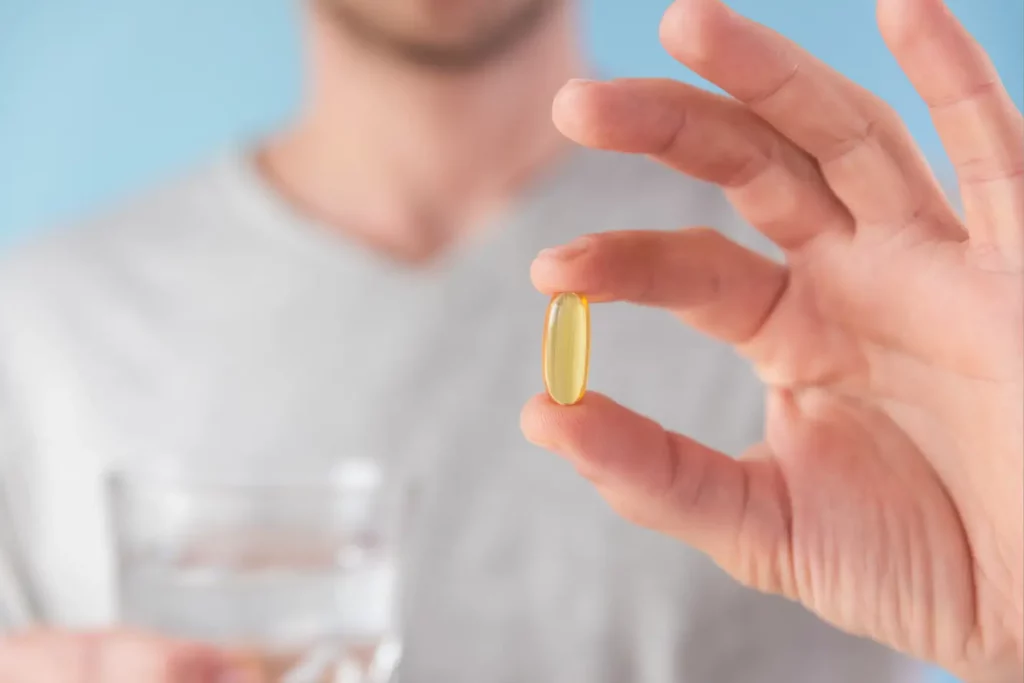
- 11 Nov 2024
- News
8 Dietary Supplements for the Working Professional
Given the hectic pace of working life in Singapore, balancing the demands of a professional lifestyle with personal well-being is no small feat. Stress, fatigue, and lack of focus are common challenges that working professionals face. As a means of alleviating some of these challenges, dietary supplements can provide targeted support to help busy individuals maintain their energy, productivity, and overall health.
Why Dietary Supplements Are Essential for Working Professionals in Singapore
In today’s fast-paced work environment, maintaining optimal health through diet alone can be challenging. This is where dietary supplements become an invaluable tool for working professionals in Singapore. Designed to complement your diet, they provide essential nutrients that may be missing from regular meals, supporting overall well-being and peak performance. Here’s why they’re crucial:
- Filling Nutritional Gaps: Studies show that many adults fall short of their recommended daily intake for key nutrients such as vitamins D, B12, and magnesium.1 Dietary supplements ensure working adults in Singapore can meet these requirements despite a hectic schedule.
- Enhanced Energy and Productivity: Nutrients like B-complex vitamins and iron can improve energy levels and cognitive function.2 For professionals tackling long work hours, supplements can help sustain focus and productivity throughout the day.
- Stress and Mental Health Support: Chronic stress, common in demanding jobs, can deplete essential nutrients such as magnesium and vitamin C. Dietary supplements like omega-3 fatty acids and adaptogens help regulate stress hormones and support mental resilience.3
- Strengthening Immunity: Busy professionals often compromise on sleep and healthy eating, which can weaken their immune systems. Supplements like vitamin C, zinc, and probiotics are known to boost immunity, reducing the risk of illness.4
- Convenience for Busy Lifestyles: Preparing balanced meals consistently can be time-consuming. Dietary supplements offer a convenient solution to fill the gaps, ensuring professionals maintain their health without disrupting their schedules.
While dietary supplements are not a substitute for a balanced diet, they act as a safety net to support optimal health. Here are 8 dietary supplements for working professionals in Singapore that can support their daily needs and help them thrive:
1. Magnesium: For Stress Management and Sleep
Magnesium is essential for over 300 biochemical reactions in the body, including those that regulate stress and sleep.5 For professionals dealing with work-related anxiety or restlessness at night, magnesium can promote relaxation and improve sleep quality.6 Supplementation can also combat fatigue, helping you feel energised and alert during the day.
2. Omega-3 Fatty Acids: For Cognitive Function
Omega-3 fatty acids, particularly EPA and DHA, are known for their brain-boosting properties.7 They support memory, focus, and overall cognitive performance, which is especially beneficial for professionals handling complex projects.8 Regular supplementation can also reduce inflammation, improving brain health and lowering the risk of burnout.9
3. Vitamin D: For Energy and Immunity
Office workers and professionals who spend most of their day indoors are often deficient in vitamin D.10 This nutrient plays a pivotal role in energy production, immune function, and mood regulation.11 Adding a vitamin D supplement to your routine can make a noticeable difference, particularly in the winter months when sunlight exposure is limited.
4. Ashwagandha: For Stress Resilience and Focus
Ashwagandha is an adaptogen that helps the body manage stress more effectively.12 It has been shown to reduce cortisol levels (the stress hormone) and improve focus and endurance.13 For professionals in high-pressure roles, ashwagandha provides the mental clarity and calm needed to stay productive throughout the day.
5. B-Vitamins: For Energy Production
B-vitamins, including B6, B12, and folic acid, are crucial for converting food into energy.14 These vitamins also play a key role in reducing tiredness and fatigue, making them ideal for long workdays.15 A B-complex supplement can ensure steady energy levels and improved focus, even during periods of high workload.
6. Probiotics: For Gut Health and Mood
A healthy gut is key to overall well-being, and probiotics help maintain this balance. Research shows that a thriving gut microbiome is linked to improved mental health and reduced stress levels.16 Probiotics can also enhance digestion, reducing bloating or discomfort that might distract you during the workday.17
7. L-Theanine: For Calm and Concentration
L-Theanine, a natural compound found in tea leaves, is known for promoting relaxation without causing drowsiness.18 When paired with caffeine, it can enhance focus, mental clarity, and productivity.19 Professionals who need a calm but alert state for tasks like presentations or brainstorming sessions will benefit from this supplement.
8. Coenzyme Q10 (CoQ10): For Cellular Energy
CoQ10 is a compound that helps cells produce energy, making it vital for professionals who feel fatigued or drained by long hours.20 It also functions as a powerful antioxidant, reducing oxidative stress and supporting overall cardiovascular health.21 CoQ10 supplementation is particularly useful for those over 30, as natural levels decline with age.
Introducing 5-hour ENERGY®: The Ultimate Energy Boost
Designed for the busy professional, this energy-boosting shot combines better mental focus and on-demand energy into a convenient 57 ml bottle. Made with zero sugar and no more than 4 calories, each shot delivers a potent blend of B-vitamins and caffeine designed to restore, recharge, and reinvigorate you, even on the slowest workday.
Discover how 5-hour ENERGY® can help you achieve more every day—grab your shot now at our official e-store.
References
1Council for Responsible Nutrition. (n.d.). Nutrient gaps and how dietary supplements can help fill them. https://www.crnusa.org/access/Nutrient-gaps-and-supplements
2Gahche, J. J., Bailey, R. L., Potischman, N., & Dwyer, J. T. (2020). Dietary supplement use among U.S. adults, 2017–2018. NCHS Data Brief, (399), 1–8.
3Grosso, G., Galvano, F., Marventano, S., Malaguarnera, M., Bucolo, C., Drago, F., & Caraci, F. (2014). Omega-3 fatty acids and depression: scientific evidence and biological mechanisms. Oxidative Medicine and Cellular Longevity, 2014, 1–16. https://doi.org/10.1155/2014/313570
4Hemilä, H. (2017). Vitamin C and infections. Nutrients, 9(4), 339. https://doi.org/10.3390/nu9040339
5National Institutes of Health. (2021). Magnesium. Retrieved from https://ods.od.nih.gov/factsheets/Magnesium-Consumer/
6Gröber, U., Schmidt, J., & Kisters, K. (2015). Magnesium in prevention and therapy. Nutrients, 7(9), 8199–8226. https://doi.org/10.3390/nu7095388
7Calder, P. C. (2013). Omega-3 polyunsaturated fatty acids and inflammatory processes: Nutrition or pharmacology? British Journal of Clinical Pharmacology, 75(3), 645–662. https://doi.org/10.1111/j.1365-2125.2012.04374.x
8Yurko-Mauro, K., McCarthy, D., Rom, D., Nelson, E. B., Ryan, A. S., Blackwell, A., … & Salem, N. Jr. (2010). Beneficial effects of docosahexaenoic acid on cognition in age-related cognitive decline. Alzheimer’s & Dementia, 6(6), 456–464. https://doi.org/10.1016/j.jalz.2010.01.013
9Meyer, B. J., & Kolanu, N. (2011). Suboptimal omega-3 levels in Australian adolescents. Nutrition & Dietetics, 68(4), 310–316. https://doi.org/10.1111/j.1747-0080.2011.01559.x
10Holick, M. F. (2007). Vitamin D deficiency. New England Journal of Medicine, 357(3), 266–281. https://doi.org/10.1056/NEJMra070553
11Martineau, A. R., et al. (2017). Vitamin D supplementation to prevent acute respiratory infections. BMJ, 356, i6583. https://doi.org/10.1136/bmj.i6583
12Chandrasekhar, K., Kapoor, J., & Anishetty, S. (2012). A prospective, randomised double-blind, placebo-controlled study of ashwagandha root in reducing stress. Indian Journal of Psychological Medicine, 34(3), 255–262. https://doi.org/10.4103/0253-7176.106022
13Lopresti, A. L., et al. (2019). The pharmacological actions of ashwagandha: A randomised, double-blind study. Medicine, 98(37), e17186. https://doi.org/10.1097/MD.0000000000017186
14Kennedy, D. O. (2016). B vitamins and the brain: Mechanisms, dose, and efficacy. Nutrients, 8(2), 68. https://doi.org/10.3390/nu8020068
15Benton, D., & Donohoe, R. T. (1999). The effects of nutrients on mood and behaviour: The role of B vitamins. Biological Psychology, 51(2-3), 197–209. https://doi.org/10.1016/S0301-0511(99)00036-8
16Dinan, T. G., et al. (2013). Psychobiotics: A novel class of psychotropic. Biological Psychiatry, 74(10), 720–726. https://doi.org/10.1016/j.biopsych.2013.05.001
17Sanders, M. E., et al. (2013). Probiotics and their role in improving human health. Journal of Clinical Gastroenterology, 47(6), 506–513. https://doi.org/10.1097/MCG.0b013e318290c12a
18Rogers, P. J., et al. (2008). Effects of caffeine and L-theanine on cognitive performance. Appetite, 50(2-3), 426–435. https://doi.org/10.1016/j.appet.2007.09.012
19Giesbrecht, T., et al. (2010). The combination of L-theanine and caffeine improves cognitive performance. Nutritional Neuroscience, 13(4), 183–190. https://doi.org/10.1179/147683010X12611460763640
20Littarru, G. P., & Tiano, L. (2007). Clinical aspects of coenzyme Q10: An update. Current Opinion in Clinical Nutrition & Metabolic Care, 10(6), 641–646. https://doi.org/10.1097/MCO.0b013e3282efdc6e
21Sharma, A., & Fonarow, G. C. (2017). CoQ10 in cardiovascular health. Journal of the American College of Cardiology, 70(6), 812–814. https://doi.org/10.1016/j.jacc.2017.06.017
